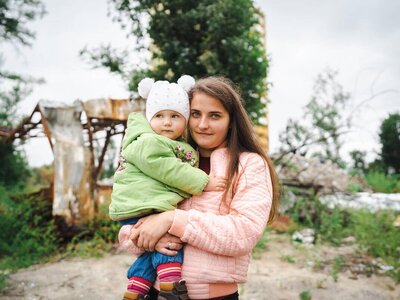Ukraine
- 5 million
- people in need of food and livelihoods assistance
- 3.7 million
- internally displaced people
- 3.8 billion
- meals provided by WFP since 2022
The war in Ukraine, now in its fourth year, continues to have devastating consequences for people inside the country while also threatening global food security.
The war in Ukraine, now in its fourth year, continues to have devastating consequences for people inside the country while also threatening global food security.
The war has caused one of the fastest forced population movements since the Second World War. A total of 5.1 million Ukrainians are still living as refugees in Europe, while another 3.7 million are internally displaced.
Many of those who stayed or returned have lost their homes or live in damaged buildings. With high inflation and unemployment across the country, an estimated 5 million Ukrainians face moderate to severe food insecurity.
Around 1 in 3 Ukrainians living in frontline regions are food insecure. In frontline areas, access to food is often compromised due to daily shelling, unsafe road and closed supermarkets. Where food is accessible, many cannot afford it. Many Ukrainians are forced to make impossible choices – such as sacrificing their own meals so their children can eat or going into debt to buy food.
The World Food Programme (WFP) works with local partners to distribute food rations within 30 km of the frontline – most of which is bought locally thanks to partnerships with local food producers and bakeries. WFP also provides cash assistance where markets are functioning, or to people suddenly displaced or evacuated.
Since March 2022, WFP has injected over US$1.3 billion into Ukraine’s economy through local procurement and direct cash assistance. In fact, WFP sources more than 90 percent of its food inside Ukraine and partners with local bakeries to distribute bread — improving efficiency while supporting local economic recovery and jobs.
However, delivering aid has become increasingly dangerous. More than 40 attacks on WFP’s distribution sites, or assets and vehicles of its humanitarian partners, were reported in the past 12 months.
Meanwhile, continued attacks on port infrastructure threaten to disrupt global food supply chains and drive up prices – Ukraine’s food exports fed 400 million people each year before the war.
WFP continues to advocate for the protection of food supply routes and the safe passage of commercial grain shipments, ensuring Ukraine can keep its role as the region’s breadbasket.
What the World Food Programme is doing in Ukraine
-
Food assistance
-
WFP delivers food kits and ready-to-eat food rations, primarily in hard-to-reach and frontline areas where commercial supply lines are disrupted and access to food is unreliable. Food kits typically comprise wheat flour, pasta, oats, canned beans or meat, sunflower oil, sugar and salt. WFP buys approximately 82 percent of this food inside Ukraine and works with local bakeries to deliver bread. WFP also provides food commodities to institutions such as hospitals, care centres, displacement centres and orphanages, to support the provision of hot meals.
-
Cash assistance and social protection
-
Agricultural mine action
-
Emergency telecommunications and logistics
-
School meals







